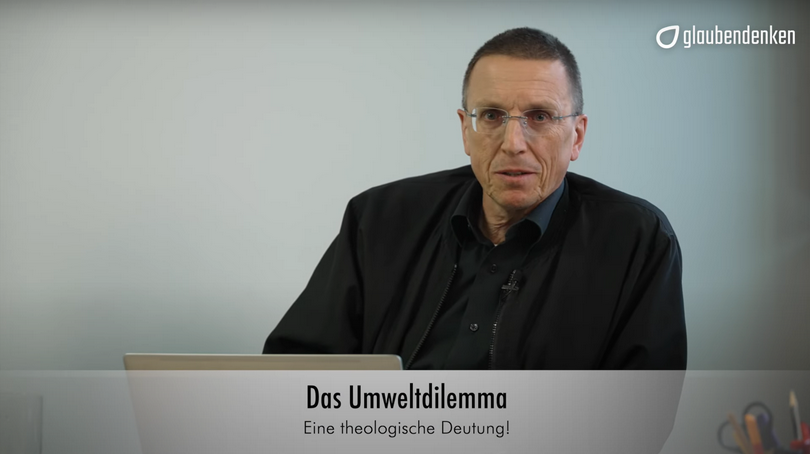On April 3, Professor Dr. Detlef Filler from International University of Liebenzell delivered an online lecture titled "Environmental Dilemma" (Umweltdilemma) as part of the "To Believe and to Think" (Glaubendenken) initiative. His presentation explored the contradiction between humanity's desire to protect the environment while maintaining prosperity, offering a theological interpretation of this tension.
Dr. Filler began by presenting key environmental indicators. Earth Overshoot Day—when humanity exhausts Earth's annual renewable resources—fell on August 1, 2024, continuing its troubling trend of arriving earlier each year. For Germany specifically, this day occurs on May 2, requiring "three Earths" if everyone consumed at German levels.
He contrasted the 68% decline in vertebrate populations since 1970 with rising atmospheric CO₂ levels—from pre-industrial 280 ppm to today's 420 ppm—explaining how this small fraction of our atmosphere significantly drives global warming through multiple feedback mechanisms.
Then Dr. Filler presented evidence showing the persistent rise in global carbon emissions despite 29 Conferences of the Parties (COPs) since the 1992 Rio Earth Summit. Apart from a temporary decline during the COVID-19 pandemic, global emissions have continued their upward trajectory. Dr. Filler traced climate awareness back to the Club of Rome's 1972 report "The Limits to Growth" (Grenzen des Wachstums), noting that resource limitations have been recognized as problematic for over half a century.
The visible manifestations of climate change were illustrated through NASA imagery showing polar ice cap reduction, with particular emphasis on the disappearance of older ice with greater reflective capacity. Beyond sea level rise, Dr. Filler emphasized the critical implications of Himalayan glacier melt for water security in South Asia, where nearly two billion people depend on river systems fed by these glaciers for agricultural productivity and survival.
In addition, Dr. Filler identified fundamental contradictions in political approaches to climate change. He cited the example of the former U.S. President Biden who, despite rejoining the Paris Climate Agreement after President Trump's withdrawal, approved more than 2,600 drilling permits in his first months in office—exceeding his predecessor's approvals during the same period. A 2021 news report noted that rising gasoline prices prompted the Biden administration to call on OPEC to increase oil production, directly contradicting climate objectives.
Similarly, he referenced Switzerland's democratic process, where a 2021 referendum rejected climate legislation that would have imposed higher costs on fossil fuels. Two years later, Swiss voters approved different climate legislation with 59% support, but the crucial difference was that it offered financial incentives rather than increased costs. This pattern, Dr. Filler argued, reveals the fundamental dilemma: People want to save the planet without any negative impact on their lifestyle or prosperity.
Furthermore, the lecture presented contrasting economic perspectives on climate action. Dr. Filler cited economist Prof. Dr. Ulrike Hermann's 2022 book The End of Capitalism: Why Growth and Climate Protection Are Incompatible and How We Will Live in the Future (Das Ende des Kapitalismus: Warum Wachstum und Klimaschutz nicht vereinbar sind – und wie wir in Zukunft leben werden). Prof. Hermann's central thesis is that prosperity since industrialization has fundamentally depended on cheap energy, and transitioning to renewable energy and circular economy systems will necessarily increase costs and reduce living standards. Her calculations for Germany suggest a return to 1970s-level household incomes, significantly reduced living space per person, and the elimination of private automobiles and air travel.
In contrast, Dr. Filler presented the perspective of Prof. em. Dr. Hans-Werner Sinn, former president of the ifo Institute. Prof. Sinn argues that Germany's commitment to reach zero emissions by 2045 is "completely impossible" (vollkommen unmöglich) without causing extensive economic damage, particularly given that renewable electricity currently constitutes less than seven percent of Germany's primary energy consumption. He contends that reductions in European fossil fuels merely redirect those resources to other markets rather than reduce global consumption.
The lecture then shifted to a theological interpretation of this dilemma. Using visual diagrams, Dr. Filler presented a biblical anthropology where the relationship between God, humanity, and creation was originally characterized by comprehensive peace or shalom in both vertical and horizontal dimensions. The vertical peace described humanity in communion with the Creator, while horizontal peace encompassed three relationships: peace with oneself, peace with neighbors, and peace with creation. Dr. Filler noted that the Hebrew terms in Genesis 2:15 are avad (to serve) and shamar (to keep, preserve), indicating humanity's intended stewardship role. According to Dr. Filler, this harmony was disrupted when humans misused their status as bearers of God's image and sought a quasi-divine position for themselves. This breach first ruptured the vertical peace with God and consequently the horizontal peace dimensions, resulting in shame, guilt, greed, competition, and exploitation of creation.
Then connecting theological insights with psychological understanding, Dr. Filler referenced Sigmund Freud's discovery of the unconscious and drives. While specific Freudian concepts may be contested, the existence of the unconscious remains widely accepted. He suggested that when people act contrary to their conscious values, unconscious factors are typically involved.
Dr. Filler proposed that biblical authors had recognized these dynamics long before modern psychology, citing the Apostle Paul's statement in Romans 7:15: "I do not understand what I do. For what I want to do I do not do, but what I hate I do." He also referenced Martin Luther's observation about the human drive to be like God: "It is not possible that the human wants God to be God, rather, he wants himself to be God."
The lecture concluded with reflections on restoration. Dr. Filler proposed that humanity's disturbed relationship with creation, neighbors, and self has its roots in the loss of relationship with God. In this context, he interpreted Jesus's statement in John 14:6 as fundamentally about restoring this vertical peace, which can only occur through God's initiative in Jesus Christ. Only this restored vertical peace can liberate humans from their contradictory tendencies and enable reconciliation with self, others, and creation. While acknowledging that biblical narratives anticipate an eventual end to the physical world, Dr. Filler emphasized that this should never lead Christians to devalue creation. Rather, those who have restored peace with God should demonstrate particular reverence toward creation, regardless of its finite nature.
During a subsequent interview, Dr. Filler clarified several points from his presentation. He distinguished between the indelible quality of being made in God's image—which constitutes human dignity—and the proper position humans should occupy in the created order. He described an inner conflict between conscious ethical awareness and unconscious self-centered drives that leads to actions harming oneself, others, and creation despite contrary intentions.
When asked whether Christianity offers distinctive environmental advantages, Dr. Filler noted that while many people of diverse worldviews care about environmental protection, reconciliation with God produces an internal transformation that can increase reverence for creation and willingness to sacrifice personal interests. He cited higher charitable giving among Christians as empirical evidence of such effects.
Reflecting on personal application, Dr. Filler described his professional engagement in development cooperation as an attempt to embody peace with neighbors, while his everyday choices aim at responsible creation stewardship. Rather than basing environmental actions solely on their efficacy, he emphasized acting out of recognition that the world is entrusted to humanity by God, requiring responsible care regardless of outcomes.












